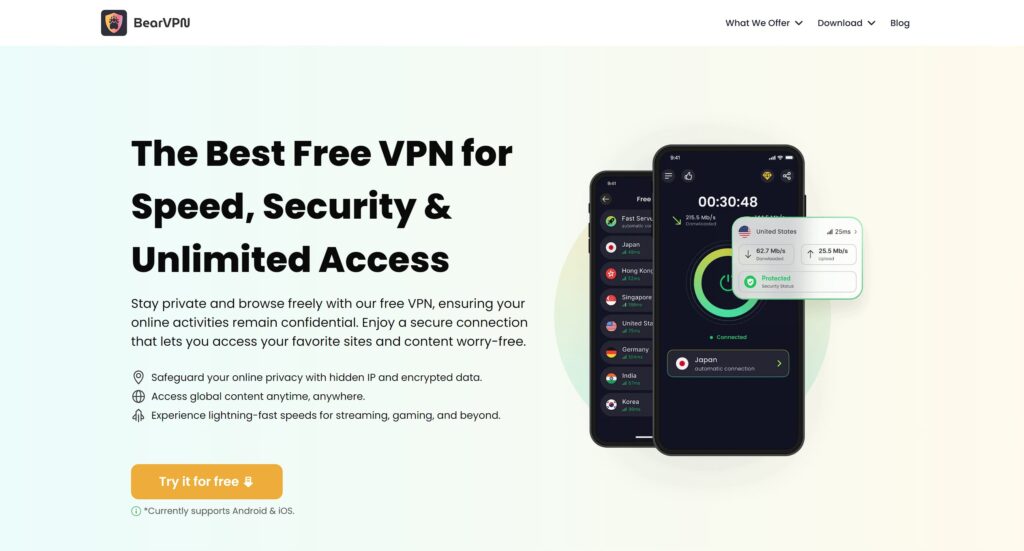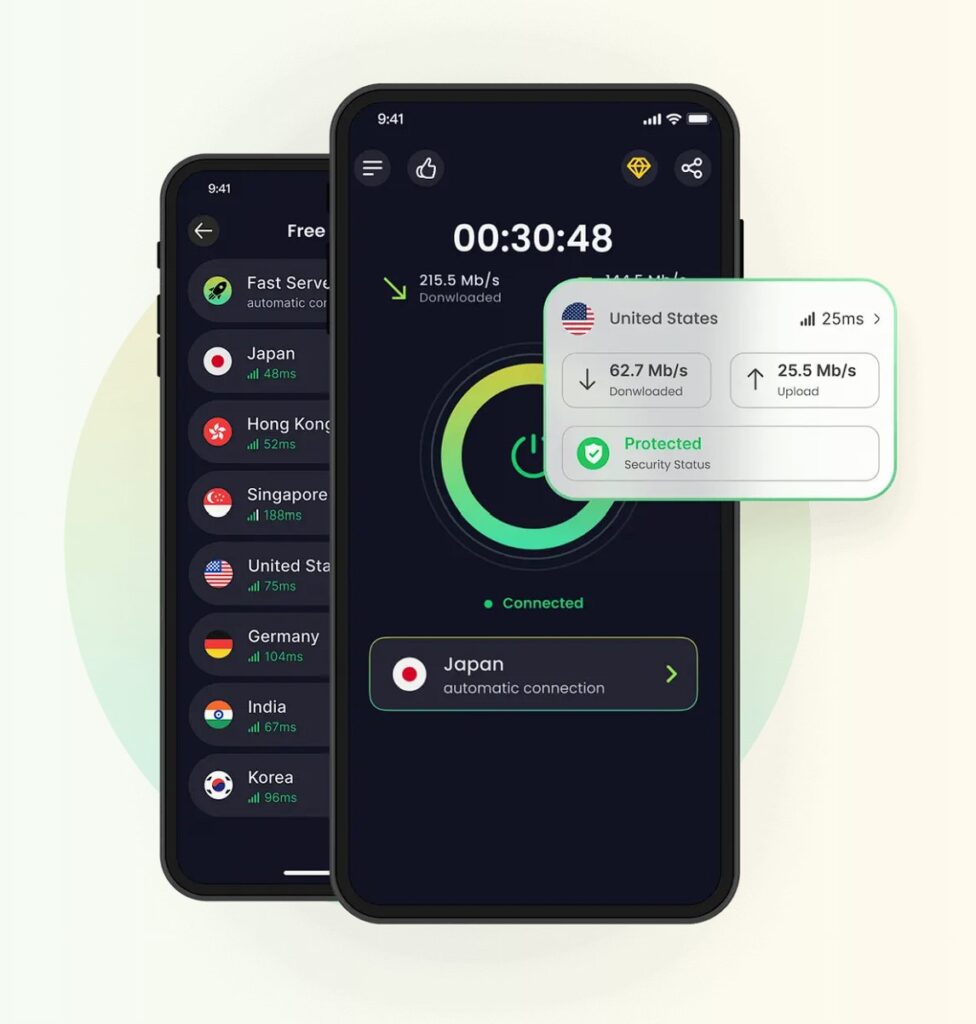Imagine you’re trying to stream your favorite Netflix show from abroad or join a high-stakes gaming match with friends. You’ve got a VPN, but your connection is laggy or even dropping. What gives?
Chances are, your VPN is using the wrong protocol.
Choosing the best VPN protocol can dramatically impact your online experience. Whether you’re aiming for faster streaming, stronger privacy, or stable mobile connectivity, the protocol your VPN uses matters. Yet, most users don’t even realize protocols can be changed, or that some free VPNs don’t use secure ones at all.
In this guide, we’ll break down the most popular VPN protocols, compare their strengths and weaknesses, and help you choose the right one. Plus, we’ll show how BearVPN, a free high-speed VPN, makes it easy by automatically using industry-leading protocols.
What Is a VPN Protocol? (And Why Should You Care?)
Think of a VPN protocol as a tunnel that connects your device to the internet. Some tunnels are wide and fast (WireGuard), while others are narrow but ultra-secure (OpenVPN). The protocol determines how your data is encrypted and routed, impacting your:
- Speed
- Security
- Stability
- Compatibility
Getting the wrong one can mean buffering, IP leaks, or dropped connections, especially on mobile or when traveling.
Quick Comparison Table
| Protocol | Speed | Security | Mobile Support | Ideal Use Cases |
| WireGuard | ⭐⭐⭐⭐⭐ | ⭐⭐⭐⭐ | ⭐⭐⭐⭐⭐ | Gaming, Streaming, General Use |
| OpenVPN | ⭐⭐⭐ | ⭐⭐⭐⭐⭐ | ⭐⭐⭐ | Privacy, Firewalls, Public Wi-Fi |
| IKEv2/IPSec | ⭐⭐⭐⭐ | ⭐⭐⭐⭐ | ⭐⭐⭐⭐⭐ | Mobile, Travel |
| L2TP/IPSec | ⭐⭐ | ⭐⭐⭐ | ⭐⭐ | Legacy Devices |
| SSTP | ⭐⭐⭐ | ⭐⭐⭐ | ⭐⭐ | Windows Firewalls |
| PPTP | ⭐⭐⭐⭐ | ❌ | ⭐⭐ | Do Not Use |
6 Major VPN Protocols Compared
Let’s explore the most widely used VPN protocols in 2025.
1. WireGuard
Best for: Speed, modern encryption, streaming & gaming
Encryption: ChaCha20
Pros:
- Extremely fast (up to 50% faster than OpenVPN)
- Lightweight, secure code (easier to audit)
- Ideal for HD streaming, gaming, and mobile apps
Cons:
- Fewer configuration options
- Still maturing in terms of obfuscation
Used by: BearVPN, NordVPN (as NordLynx), Surfshark, ProtonVPN
2. OpenVPN (UDP/TCP)
Best for: Maximum privacy, bypassing censorship
Encryption: AES-256 (military-grade)
Pros:
- Time-tested, open-source, extremely secure
- Works on virtually every platform
- Can run on UDP (faster) or TCP (more reliable)
Cons:
- Slower than WireGuard
- Requires more computing resources
Used by: BearVPN, ExpressVPN, CyberGhost, nearly all premium VPNs
3. IKEv2/IPSec
Best for: Mobile devices, switching networks (e.g. Wi-Fi to LTE)
Encryption: AES-256
Pros:
- Fast and stable on smartphones
- Excellent at re-establishing connections
- Often pre-installed on mobile OS
Cons:
- Not open-source (developed by Microsoft/Cisco)
- Less customizable than OpenVPN
Used by: BearVPN, TunnelBear, Windscribe, Private Internet Access
4. L2TP/IPSec
Best for: Compatibility with older systems
Encryption: AES-256
Pros:
- Supported natively on many platforms
Cons:
- Slower due to double encapsulation
- Vulnerable to deep packet inspection
Use only when: No other option is available.
5. SSTP
Best for: Windows users behind firewalls
Encryption: SSL/TLS
Pros:
- Difficult to block (uses TCP 443)
- Integrated with Windows OS
Cons:
- Proprietary (Microsoft-controlled)
- Poor cross-platform support
6. PPTP
Best for: Nothing in 2025
Encryption: Weak (MPPE)
Cons:
- Easily cracked and monitored
- Considered obsolete since the early 2010s
Avoid this protocol entirely.
Which VPN Protocol Is Best for You?
There’s no one-size-fits-all answer when it comes to VPN protocols—each has its strengths, and the “best” choice depends on how and where you use your VPN. Below, we match real-world user types with the protocol that suits them best, so you can make a smarter choice (or simply let BearVPN pick for you).
1. The Mobile Nomad
Scenario: You’re often on the move—switching between coffee shop Wi-Fi, your home connection, and mobile data.
Best Protocol: IKEv2/IPSec or WireGuard
Why: IKEv2 is excellent at quickly re-establishing lost connections when switching networks. WireGuard also performs well on mobile, thanks to its lightweight design and speed.
2. The Streamer & Downloader
Scenario: You love binge-watching shows, downloading large files, or attending livestream events without buffering.
Best Protocol: WireGuard
Why: WireGuard provides the best performance for speed-hungry tasks. Its efficient encryption ensures high data throughput, making it ideal for streaming Netflix, YouTube, or Twitch.
3. The Privacy Purist
Scenario: You’re concerned about surveillance, tracking, and want complete digital anonymity.
Best Protocol: OpenVPN (TCP)
Why: OpenVPN is open-source, battle-tested, and uses strong encryption (AES-256). It’s ideal for protecting data in high-risk environments like public Wi-Fi or untrusted networks.
4. The Censorship Buster
Scenario: You’re located in a country or institution (e.g., school or workplace) that restricts or blocks certain websites.
Best Protocol: OpenVPN (TCP 443) or SSTP
Why: OpenVPN over TCP can mimic HTTPS traffic and is harder to block. SSTP, being a Windows-native protocol over port 443, also slips through firewalls effectively.
5. The Competitive Gamer
Scenario: You play real-time multiplayer games and need the lowest possible ping.
Best Protocol: WireGuard
Why: WireGuard is optimized for low latency and minimal packet loss, crucial for gaming performance. It’s also more efficient in CPU usage, reducing lag.
6. The Remote Worker
Scenario: You use your VPN to access work tools, email, or private servers while traveling or working from home.
Best Protocol: IKEv2/IPSec or OpenVPN
Why: IKEv2 provides stable reconnection on unstable networks. OpenVPN ensures strong encryption if you’re handling sensitive data or working over shared networks.
7. The Casual Browser
Scenario: You just want to avoid tracking, access restricted websites, and browse privately.
Best Protocol: WireGuard
Why: It offers a great balance of speed and privacy without complicating the user experience.
What About Proprietary Protocols?
Some premium VPNs have introduced their own protocols:
- NordLynx (NordVPN) – Based on WireGuard, with added privacy features.
- Lightway (ExpressVPN) – Lightweight and efficient, similar to WireGuard.
- Chameleon (VyprVPN) – OpenVPN + obfuscation to bypass VPN blocks.
These aren’t fundamentally different—just custom wrappers over existing tech. BearVPN uses standard open protocols, so you get trusted security without vendor lock-in.
How BearVPN Makes Protocols Easy for Everyone
Choosing the right VPN protocol can be a technical challenge, but it doesn’t have to be. BearVPN was built with simplicity in mind, offering advanced protection and blazing-fast speeds without requiring users to understand complex settings or configurations.
What Is BearVPN?
BearVPN is a free, privacy-first VPN service that provides high-speed global access using top-tier encryption standards. Unlike many other free VPNs, BearVPN doesn’t throttle your speeds or limit your bandwidth. It’s designed to deliver a premium VPN experience to everyone.
Whether you’re streaming, gaming, working remotely, or just browsing securely, BearVPN uses the most advanced protocols—including WireGuard and OpenVPN—to ensure your data stays safe and your experience stays smooth.
Key Features of BearVPN
- One-Click Smart Connection: No tech knowledge required. BearVPN instantly selects the best protocol and server based on your location and usage.
- Advanced Protocols: Secure and fast connections powered by WireGuard and OpenVPN.
- Global Network: Over 1000+ servers in 50+ regions, ensuring low-latency connections worldwide.
- Unlimited Bandwidth: No throttling, no caps—stream and download as much as you want.
- Strict No-Logs Policy: BearVPN does not collect or store your browsing history or personal data.
- Cross-Platform Compatibility: Available for Windows, Android, and iOS. macOS is coming soon.
How to Use BearVPN (Step-by-Step Guide)
Step 1. Download BearVPN
Visit the BearVPN official website or your app store and install the BearVPN app on your device.

Step 2. Open the App
Launch the app and optionally create a free account (if needed). Press the large “Connect” button. BearVPN will automatically select the best server and protocol (e.g., WireGuard for speed).

Step 3. Enjoy Secure Internet
Once connected, your traffic is encrypted and routed through a secure tunnel—no manual settings needed.
Step 4. Switch Locations
Want to access content in another country? Tap the location list and select a new server. BearVPN adjusts your protocol as needed.
Step 5. Disconnect Anytime
Tap “Disconnect” to end your session. Your IP returns to normal, and BearVPN stops routing your traffic.
FAQs: Best VPN Protocols
What is the fastest VPN protocol in 2025?
WireGuard is currently the fastest, especially for streaming and downloads.
Which VPN protocol is most secure?
OpenVPN with AES-256 remains the gold standard for security. WireGuard also offers strong security with modern cryptography.
Can I use WireGuard on mobile?
Yes! Most major VPN apps (including BearVPN) support WireGuard on Android and iOS.
Do free VPNs support these protocols?
Many don’t—or they hide them behind paywalls. BearVPN is a rare exception that includes WireGuard and OpenVPN for free.
What happens if I choose the wrong protocol?
You might face buffering, dropped connections, or even IP leaks. BearVPN prevents this by automatically choosing the best option.
Final Thoughts: The Best Protocol, Without the Headache
In 2025, WireGuard is the fastest and most future-proof VPN protocol, while OpenVPN offers unmatched security and flexibility. IKEv2/IPSec is still unbeatable for mobile use. And outdated protocols like PPTP? Best left in the past.
But you don’t need to memorize charts or fiddle with protocol settings. BearVPN uses smart defaults to connect you securely—automatically.
It’s free, fast, and private by design. Try BearVPN now and experience what secure browsing feels like—no settings, no fees, no compromise.



